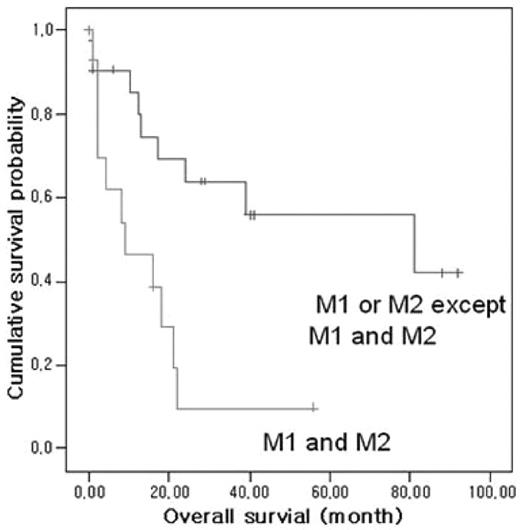Abstract
Dysruption of cell cycle control genes (p16, p15 and p14) is known to be involved in the tumorigenesis of multiple myeloma (MM). We investigated the inactivation status of p16, p15 and p14 genes using promoter methylation study and fluorescent in situ hybridization (FISH) study in patients with MM and analyzed the association of inactivation of those genes and clinical prognosis.MM Promoter methylation study of p16, p14 and p15 gene was done with newly diagnosed 52 patients with by bisulfite modification and methylation specific PCR. Two sets of primers were used for p16 methylation study and one set of primer was used for p15, p14 methylation study. Deletion of p16, p14 and p15 gene was detected by dual color FISH (Vysis, Downers GroveIL, USA). Overall survival was analyzed by Kaplan Meier Method and Cox’s proportional hazard model. Methylation of p16, p15 and p14 promotor was detected in 36/52 (69.2%), 15/52(28.8%) and 7/52 (13.5%) patients with MM, respectively. Methylation of any of p16, p15 or p14 promotor was observed in 44/52 (84.6%) of MM patients Deletion of p16, p15 and p14 was detected in only one of the patients with MM. Of note, in the cases (15/52, 28.8%) showing that in cases with two positive methylation specific PCR of the p16 promotor with two sets of primers, significant lower overall survival rate (p<0.036) were observed compared with only one positive methylation specific PCR. Heavy methylation of p16 protomor was a independent predictive variable for overall survival [Hazard Ratio, 3.74; 95% CI, 1.44–9.68, P = 0.007]. Other adverse prognostic factors by univariate analysis were old age (p=0.014), β2-microglobuline (p=0.026), high serum creatinine levels (≥2.0 mg/dL, p=0.014). More than 80% of MM patients showed the methylation of any of p16, p15 or p14 promotor, which suggest the potential applicability of hypomethlyating agents to MM. The promoter methylation of p16, p14 or p15 was a major contributor to the disruption of cell cycle regulation in MM, whereas both the deletion and/or the promoter methylation of p16, p14, and p15 contributed to the disruption of cell cycle regulation in ALL. In our study, methylation of two positive methylation specific PCR of the p16 promotor was an independent adverse prognostic factor in MM. We infer that quantitative methylation study for p16 promotor is helpful for the evaluation of prognosis.
Overall survival analysis of patients with according to p16 methylation amount (P = 0.036)
Overall survival analysis of patients with according to p16 methylation amount (P = 0.036)
Author notes
Disclosure: No relevant conflicts of interest to declare.


This feature is available to Subscribers Only
Sign In or Create an Account Close Modal